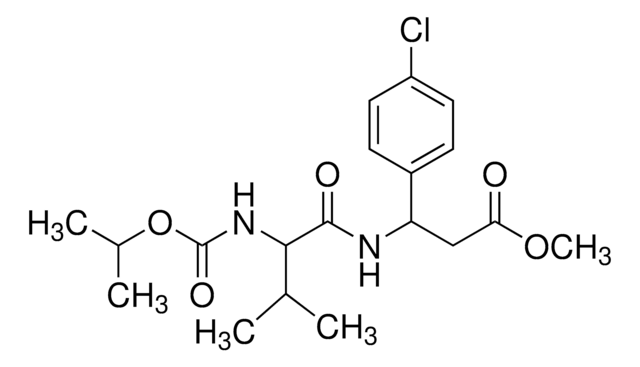32393
Pyridalyl
PESTANAL®, analytical standard
Synonym(s):
2-{3-{2,6-Dichloro-4-[(3,3-dichloro-2-propen-1-yl)oxy]phenoxy}propoxy}-5-(trifluoromethyl)pyridine, [2,6-Dichloro-4-(3,3-dichloroallyloxy)phenyl]-3-(5-trifluoromethyl-2-pyridyloxy)propyl ether
About This Item
Recommended Products
grade
analytical standard
Quality Level
product line
PESTANAL®
shelf life
limited shelf life, expiry date on the label
application(s)
agriculture
environmental
format
neat
SMILES string
ClC1=C(OCCCOC2=NC=C(C(F)(F)F)C=C2)C(Cl)=CC(OCC=C(Cl)Cl)=C1
InChI
1S/C18H14Cl4F3NO3/c19-13-8-12(27-7-4-15(21)22)9-14(20)17(13)29-6-1-5-28-16-3-2-11(10-26-16)18(23,24)25/h2-4,8-10H,1,5-7H2
InChI key
AEHJMNVBLRLZKK-UHFFFAOYSA-N
Looking for similar products? Visit Product Comparison Guide
General description
Pyridalyl has to be monitored in the Multiannual Control Programme for Pesticides Residues (MACP), run within the EU and EFTA in/on products of plant origin.
Pyridalyl was approved on 1 July 2014 under the Commission Regulation (EU) No 143/2014/EU as per the Regulation (EC) No 1107/2009 as amended by Commission Implementing Regulations (EU) No 540/2011 and 541/2011. Upon receiving an application to set the new MRLs for pyridalyl from the Evaluating Member State (EMS) following Article 9 of the Regulation on 14 January 2009, EFSA has proposed an MRL of 1 mg/kg for tomatoes, 1 mg/kg for aubergines (eggplants), 2 mg/kg for peppers, 0.2 mg/kg for cucurbits (inedible peel), 3 mg/kg for lettuce, and 0.1 mg/kg for cottonseed.
Application
- To determine the toxicity of pyridalyl on each growth stage of 2 insect pest species and to evaluate its cytotoxicity on the Sf9 insect and CHO-K1 mammalian cell line using the trypan blue exclusion method
- To assess the lethal and sublethal effects of methoxyfenozide and pyridalyl on the larval ectoparasitoid Habrobracon hebetor
- Investigation of the molecular action of Pyridalyl via cytochrome P450 activity using non-selective cytochrome P450 inhibitor, 1-ABT (1-aminobenzotriazole)
- Evaluation of in vitro insecticidal activity of pyridalyl nanosuspension in comparison to technical material and commercial product against tomato fruit and shoot borer (Helicoverpa armigera)
- To elucidate the persistence behavior and risk assessment of pyridalyl in tomato, cabbage, and cultivated field soil over two consecutive seasons
Recommended products
Legal Information
Signal Word
Warning
Hazard Statements
Precautionary Statements
Hazard Classifications
Aquatic Acute 1 - Aquatic Chronic 1 - Skin Sens. 1
Storage Class Code
10 - Combustible liquids
WGK
WGK 3
Flash Point(F)
Not applicable
Flash Point(C)
Not applicable
Choose from one of the most recent versions:
Already Own This Product?
Find documentation for the products that you have recently purchased in the Document Library.
Our team of scientists has experience in all areas of research including Life Science, Material Science, Chemical Synthesis, Chromatography, Analytical and many others.
Contact Technical Service










